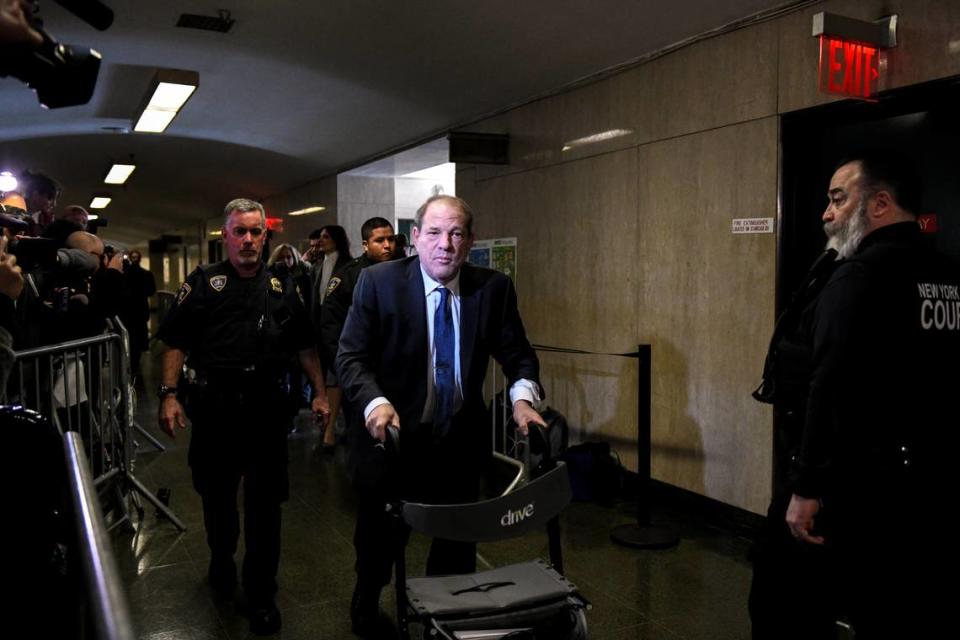Weinstein’s conviction overturned but same rule won’t apply to Golubski. Here’s why | Opinion
Women and others who think that rape should not go unpunished gasped more in horror than disbelief at Thursday’s news that disgraced former Hollywood producer Harvey Weinstein’s felony sex crime conviction in New York had been overturned by the New York Court of Appeals.
The 4-3 decision, handed down by a majority female court, said that Weinstein’s trial judge, Justice James M. Burke, should not have allowed women who testified that Weinstein had assaulted them, too, to tell the jury about acts for which he had not been charged.
I say some of us gasped in horror because the hard-won, painfully belated #MeToo moment that followed revelations about Weinstein sometimes seems to have disappeared without a trace.
And I say it was not so hard to believe because this was, after all, also the week that the U.S. Supreme Court actually argued over whether federal law requires hospitals to perform emergency abortions in states like Idaho, where the procedure has been banned except to save a woman’s life.
Justice Sonia Sotomayor asked the lawyer representing Idaho if his state’s ban would thus rule out an abortion even to prevent the loss of an organ, or other serious medical consequences. “Yes, Idaho law does say that abortions in that case aren’t allowed,” he said.
Whatever you think about abortion rights, you’d think that we could agree that women should get to keep all of their organs.
This decision in the Weinstein case is also not so surprising because there was always concern about the admissibility of testimony about “prior bad acts” under New York law.
So, since the judge in the federal civil rights case against former KCKPD detective Roger Golubski recently ruled that 7 such “prior bad act” witnesses are going to be allowed to testify against him, does that mean that that case, too, is in trouble?
No, because federal rather than state rules of evidence apply, and they are more lenient, said former Kansas federal prosecutor Mike Warner. “You can’t just use it to show that the accused is a bad guy,” he said, “but there’s a much stronger basis in a Golubski-type case” to use testimony about prior bad acts to establish “a pattern of conduct.”
Golubski is charged with civil rights violations for acting “under color of law” to rape and kidnap two women between 1998 and 2002, starting when one was 13 years old. Seven other women will testify that he raped or attempted to rape them, too. In a separate sex trafficking conspiracy case, he is charged with working with three drug dealers to hold girls as young as 13 in “involuntary servitude.”
It was Kansas Sen. Bob Dole who we have to thank for the part of the Violent Crime Control and Law Enforcement Act of 1994 that makes it possible, in cases in which a defendant is charged with a sex crime, for federal prosecutors to introduce evidence of the defendant’s bad character in order to prove that the defendant committed the crime.
Still, for “prior bad act” evidence to be admissible in federal cases, the judge in the case has to rule that a jury could find by a preponderance of the evidence that the uncharged acts occurred. The judge also must find that the testimony is relevant, probative, and that its value wouldn’t likely be outweighed by the possibility that it could cause undue prejudice against the defendant.
Last month, federal judge Toby Crouse said all of those requirements had been met in the case against Golubski, so “the Government’s motion to admit the testimony of all seven other victims is granted.”
In the New York case against Weinstein, the majority opinion said the testimony about other sexual assaults just wasn’t relevant.
Weinstein was also convicted in Los Angeles in 2022. Now, New York district attorney Alvin Bragg must decide whether or not to retry Weinstein.
The Golubski and Weinstein cases do have certain things in common: They both involve powerful men accused of violating a number of women. But “the issue in Weinstein was consent, and in Golubski, it’s whether it happened” at all, said William Skepnek, who is representing women bringing a civil rights lawsuit against Golubski and his former employers.
In Crouse’s ruling that other women could testify about uncharged acts, the judge carefully laid out how he came to that conclusion.
He cited the 2012 case United States v. Sturm as finding that “the more seriously disputed the material fact” — in this case, that Golubski raped Ophelia Williams and the second victim, known only as S.K. in court documents — “the more heavily this factor weighs in favor of admissibility.”
The fact that Golubski strongly denies sexually assaulting Williams and S.K., in other words, argues that the other women should be heard. Why? “In particular,” Crouse wrote, “the fact that many unique details” of Williams’ and S.K.’s stories “also appear in the proposed testimony” of the other seven women “makes it more likely that the trier of fact will find” Williams and S.K. credible.
“The charged and other acts are similar,” the ruling says. “Each involve nearly the same alleged set of forced sex acts and were perpetrated using the same set of tactics: employment of information only a police officer would know to construct an offer of aid to a vulnerable victim, seclusion of the victim, use of violence, similar threats of death or imprisonment of a family member, and follow-up visits to ensure silence. And each of the victims fit a certain profile: a Black woman made vulnerable by her or her family members’ interactions with the criminal justice system within the community where Golubski served.”
There’s no question that the decision to overturn Weinstein’s conviction in New York is a psychological blow, not just to Golubski’s accusers but to all victims.
But on the law, said Skepnek, “I don’t think there’s much to learn here for Golubski.”


